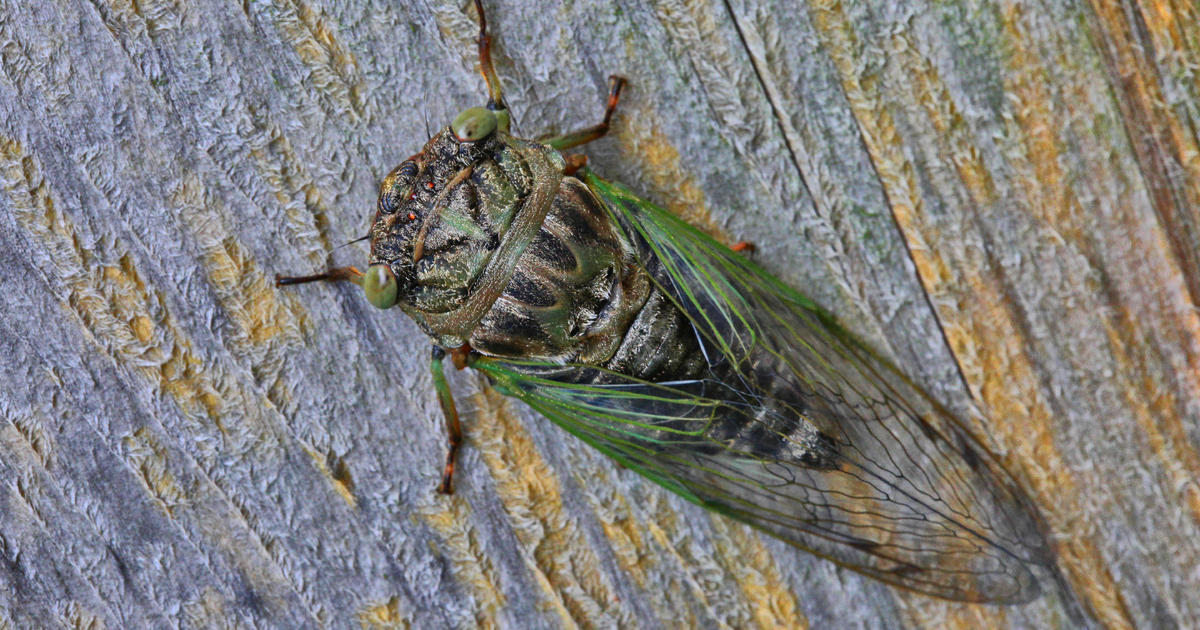Curiocity: Q & A With 'Top Model's' Nigel Barker
But when it comes to true, breathtaking beauty, he'll tell you it takes a heck of a lot more than a pretty face and perfect physique.
On the hit show, "America's Next Top Model" he's best known for helping to mold the next generation of models, alongside Miss Tyra Banks. And though he's had more than 20 years of experience in the industry -- starting as a fashion model before moving to the other side of the lens as a world-renowned photographer -- it may surprise you that his definition of true beauty reaches far beyond the superficial.
In his new book, "Beauty Equation," Barker reaches beyond the sometimes shallow definitions of what makes someone attractive to reveal the inner beauty within us all. Through a series of photo challenges, Barker puts the reader to the test to find that loveliness that's sometimes hidden by self-doubt.
Barker will be signing copies of his new book at the Mall of America on Wednesday, but before he does, he took a few minutes out of his hectic schedule to talk with us about beauty, confidence and the inspiration he finds in everyone he photographs.
-------
In your new book, you talk about true beauty really being an equal equation between outer and inner beauty, and general self-esteem. But a lot of people probably look at you and think, OK, so he was a fashion model and now he photographs models. Isn't being skinny and tall the keys to true beauty? How has your experience in the fashion world -- and from being a model -- helped you define this true beauty?
Nigel Barker: Well, first of all, being a photographer in general, my job is to take beautiful pictures no matter where I point my lens, so to speak. When you're photographing a model, I think there's a big difference between what is attractive, what is pretty and what is beautiful. Being pretty and having fair skin, or clear skin or long hair -- and certain attributes that one considers models to have -- has actually nothing to do with whether you're considered beautiful, are thought of as beautiful or are beautiful. What I try to do to make a picture iconic, or timeless, or classic, is to search for beauty. No matter who I'm photographing.
You might have what some would consider a model façade, but if I can't find the life in you, if I can't harness that inner beauty, the spontaneity of the individual, the passionate side, or make something special happen from within then the picture's just a picture. It's like, 'Oh that's a pretty girl' but that doesn't really move anybody. I've taken photographs of people from all over the world, places like Port Au Prince, Haiti, and pediatric AIDS clinics in Tanzania, who have that warm hospitality and charm that connects in a way that's so charismatic that you can't help but fall in love. That's basically what beauty is about. Those are the sorts of photographs that move people.
One of the reasons I wanted to become a photographer was back in the mid-80s, a great photographer called Steve McCurry took a photograph of a stunningly beautiful young Afghan girl, on the cover of National Geographic, which has now become one of the most iconic National Geographic covers of all time. When you think about it, was it really because she was super pretty? Of course not. She was just a young girl, probably about 12 -- I must've been about 8 -- but I look into the eyes of this little girl and it was haunting, there was fear, there was hope and there was strength. And that kind of life you relish in a young person. So my book is all about who you are, and the more you remote from within, the more beautiful an individual you will become and you are. And I believe there's beauty in everybody and my job has always been to find that. ... Even when working with models, that's how I cast, that's what I look for and that's one of the reasons on "Top Model" that we talk about personality so much.
Definitely. And adding on to that, you talk a lot about confidence in the book, but as we've seen on "America's Next Top Model," sometimes too much can turn beauty ugly. Where do you think the balance is?
Barker: That's the thing, I would say that's not confidence. I think people get confused by the two, and we talk about it in the book at great lengths. There's a difference between confidence and conceit -- it's a fine line. Confidence is the belief that you can do it. And if you fail, you just pick yourself up and try again. Confidence is when you come in last in a race, but still feeling that you did a good job. Conceit is feeling like you're better than the next person and that you're superior. Nothing is uglier than that.
However attractive you might be -- you might have big, plump lips, beautiful hairdo and fabulous fashion garments but if you think you're looking better than everyone else in the room, trust me, everyone's looking at you thinking you're certainly not.
A modest, humble confidence just shines out like a shining star in a room. If you look at people in history who are iconic beauties ... it's actually people like Mother Theresa and Ghandi and various people like that who just have a striking sense of themselves, yet very quiet. I was just at a signing last night at Westport, Connecticut and a young girl said to me, 'You know I don't feel confident. I wish I was taller and I've been dieting for the last two years. I'm not getting anywhere and I'm looking for confidence.' There was several people in the audience kind of murmuring in agreement ... and believe me, so do I.
One of the big things in my life, that has helped me remain confident and feel strong and have a greater passion for life than I already have, was working with the extraordinary organizations out there in the humanitarian field. What we do in the book is encourage people to get out there and help in the community and give back -- and by doing so, you're actually rewarding yourself tenfold. That's the reason why there's a saying, 'Pleasure is in the giving, not the receiving.' ... You do stand taller, you do feel better about yourself and you do recognize how lucky you are and all of a sudden you feel more beautiful and you appear more beautiful. That's why in the book, I want you to embody this, embrace these ideas and I want to photograph you -- but you know, do it yourself or have a friend do it. These are the tricks I use to motivate my subjects, no matter where I'm at, to take a great shot and to motivate that beauty. I really believe what I'm talking about and that's why I'm here 20 years later. These things really work.
And we have a really great website (beautyequation.com) where you can upload your photos, videos, upload your written challenges -- or keep them private if you wish -- or what we're hoping, is for people to make it public, and get the conversations going. It's to inspire people the world over to have a conversation about beauty.
We had one woman who sent in a photograph of herself, who is 60 years old, fought breast cancer and she's flashing her chest but one of her breasts is removed. But she's smiling and she just looks courageous. And we had a lot of women chiming in thinking how fantastic this is, how great it was and how beautiful she is, too.
And what is that like for you? To see those results and to know you're inspiring that kind of beauty conversations? Especially when you're helping people's confidence.
Barker: There's nothing else I want more. I have two children of my own and a lot of the reason I committed to writing the book is having these two kids and watching them grow up and seeing them ask me questions and wanting to have the answers. And obviously, working in the fashion industry, you know, it is a really frivolous business, but there's also a reason for it -- as frivolous as fashion can be, it's also very poignant, too. When you get dressed to go to work or to go out for the evening, as much as it sounds corny or cliché to say we're making a fashion statement, we are actually making a life statement. ...
So often, as frivolous as it is, there's actually massive statements as to who we are as people. And I discuss this in the book as well. I'm not about telling you what's right or wrong, I'm more about saying, 'Look, you've got to be authentic, you've got to be believable and if this is who you are, then rock it like there's no tomorrow.' And if not, then think about that and try to be true to you, because you'll be a much more happy individual, doing that and being that person.
When you were talking about the self-portrait challenges in the book, what have you learned in your many years behind the lens when it comes to taking that gorgeous photograph and finding that photo that will maybe show someone something they haven't seen before?
Barker: My work with the Make-A-Wish Foundation I think is really rounded that out because I work with these children who are often suffering from life-threatening illnesses, and I've got to say, several children over the years have actually passed away after I've photographed them, whether a year or two later or whatever. But that day has always been about creating a day of joy, a day of fun, a day of forgetting the pain, not just the pain for the child but for the whole family.
When they see the photographs, when they've felt most of their lives in agony, or feeling wretched or horrible, they've been in such pain, they've gone through chemotherapy, they've lost their hair or have scars on their body ... and then you take a photograph of them, not concentrating on the problems, and even when the scar is straight to camera, when there's a sense of pride to the life they've led, a sense of pride of the pain they've been through, and you realize they're young survivors, they're caring, considerate, they're fighters. You take a picture that shows all of that and it literally draws tears to your eyes.
I've made many great friends with parents that have come up to me crying, thanking me, saying that it's one of the best days of their life. You don't have to be a photographer to do these things. Anyone can be a photographer, anyone has the power to grow up and wish. It's very simple wishes that many of us can help with. A sense of community is what we need more of.
Do you feel that being a model has made you a better photographer?
Barker: I think it definitely helps me empathize with my subjects. I was a model for about seven or eight years, in the mid80s, early 90s and it was fun and I enjoyed it, traveled around the world, met some great people, and I certainly got an interest in the fashion business. I think everything that I do shapes who I am and the way I work, and the way I operate. But it was more a way into a business that I found fascinating that is so much the style of my photography. It really is more about the individual and the person. I'm not sure if that comes from the way I modeled but none the less, it's an interesting way into a business.
Where are you in shooting "America's Next Top Model?"
Barker: Season 15 is wrapped and it's begun airing now. Season 16, we start shooting in October.
What do we need to know about the new season?
Barker: Well we just had our first elimination. And as most people know, Italian Vogue is our magazine sponsor, which is a huge deal for "Top Model." We've had Seventeen Magazine for a very long time and they were a fantastic magazine partner but to be in Vogue and to be in Italian Vogue is a very big deal for anyone in fashion. For these young models, as a springboard, it's unbelievable; you really can't get any better than that. I think we're very proud to have gotten there and have that kind of prize package to offer the girls. ... I'm curious to see who turns out to the auditions now.
What is it like behind the scenes of "Top Model?"
Barker: It's actually -- pretty much what you see is what you get. I would say all the judges are just like what they are like on TV. One of the great things about the show is we're all industry experts, within our field, it's actually what we do. It's not like we're a bunch of celebrities that have nothing to do with what we're talking about and we're just doing a talent show. I think it's that authenticity that's one of the reasons that viewers love it. I work in the fashion business, that's what I do, I actually have a shoot going on in my studio right now.
And that's the business we work in. Andre Leon Talley is the editor at large for American Vogue, Tyra is and was and has been a supermodel for years, Miss J is a runway coach, lived in Paris, that's what he does. I think that sense of authenticity is brought to life and that's what the show is really like. People are often surprised, thinking we're going to be this different person, and then they meet us and we're almost identical.



